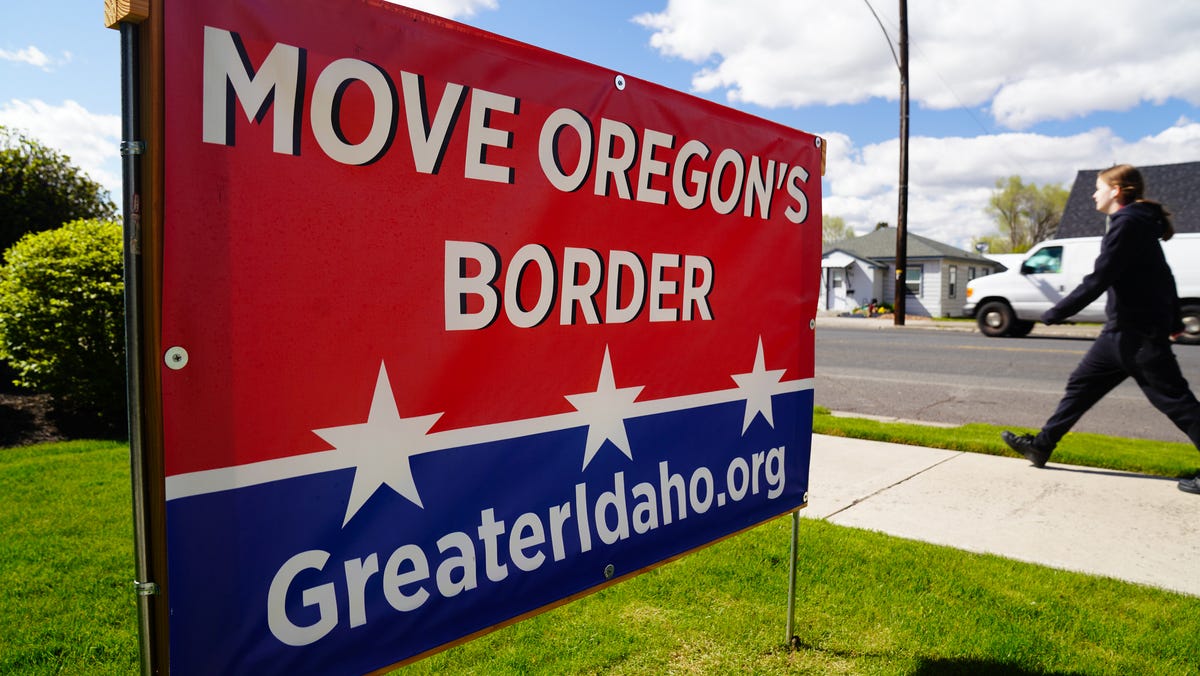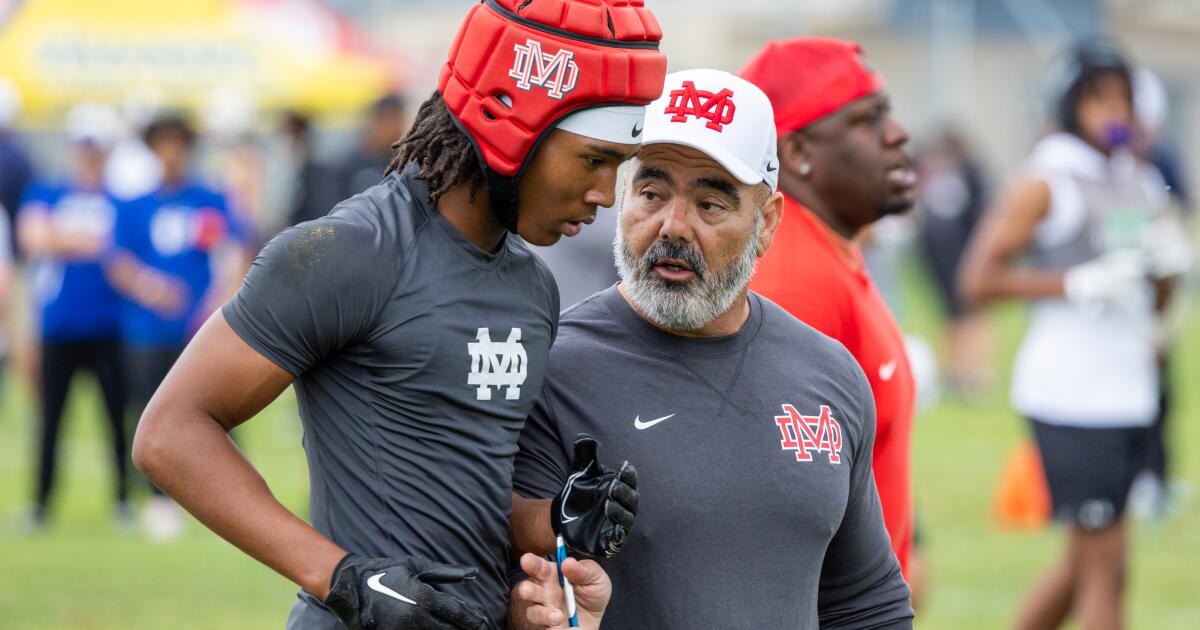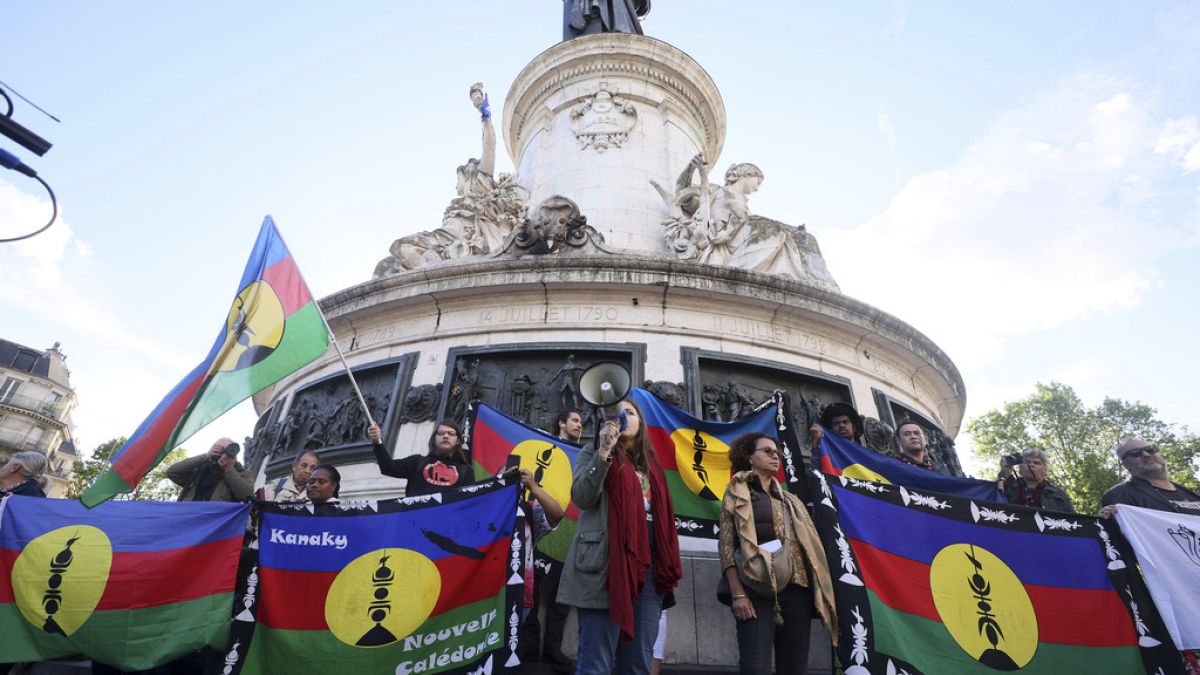World
Is democracy at risk of extinction?
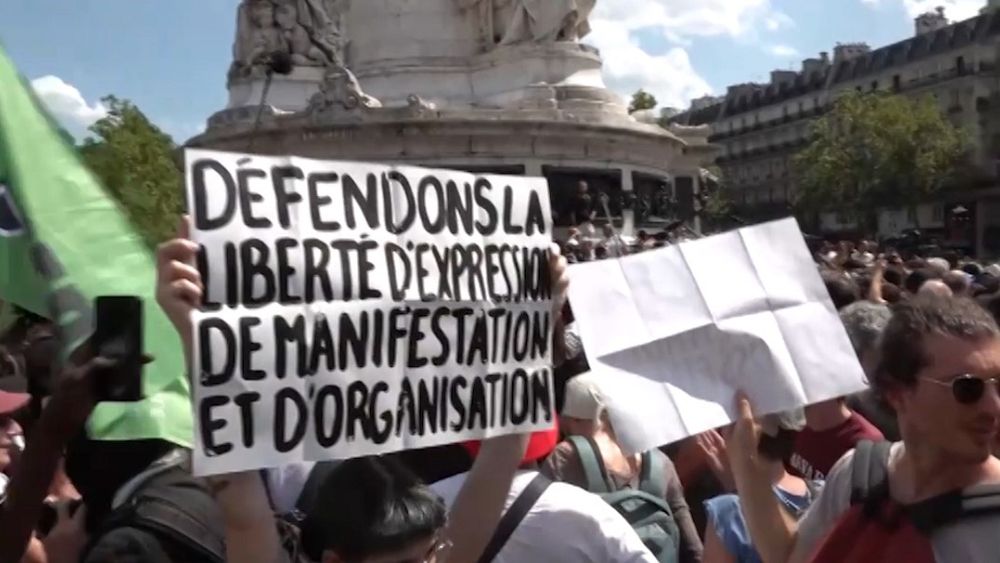
According to a survey by Open society foundations, more than a third of 18-35 year olds favour a military regime or an authoritarian leader. How did it come to this?
Do people still believe in democracy? This was the question asked by a recent Open Society Foundations poll, which for the second consecutive year surveyed more than 36,000 people in 30 countries around the world to hear their opinions and feelings about human rights, democracy, and other important issues facing countries around the world.
The “Open Society Barometer: Is Democracy Effective?” survey, one of the largest global polls ever conducted, was conducted between May and July 2023 and the results, published in the run-up to International Democracy Day, are surprising, to say the least.
The concept of democracy is still widely popular in every region of the world: 86% of respondents say they would prefer to live in a democratic state and 62% believe that democracy is the best possible form of government. In Italy, the results were 91% and 69% respectively.
Only 20% of people said that authoritarian states are more capable of satisfying citizens’ demands and are more efficient in dealing with major issues at home and in the international arena.
What is surprising, however, is that although trust in democracy is still high across the board, the age group that is most sceptical about its effectiveness is the youngest one, those aged 18 to 35.
If we look at the data disaggregated by age group, the percentage of citizens who consider democracy to be the best possible form of government drops to 55% among the youngest, while it is 61.4% among the 35 to 55-year-olds and 69% among those older than 56.
What is more, 42% of those aged 18-35 said that a military regime is a good way to govern a country, while 35% are in favour of a ‘strong’ leader who dispenses with elections and parliament. In Italy, the percentages drop to 24 and 32%, respectively.
But how did we get here – and what does it mean for the survival of democracy?
“It is really worrying that the lowest support is in the youngest group, the 18 to 35-year-olds because today we have the largest generation of young people. Half of the world is under 30,” says Natalie Samarasinghe, Global director for advocacy at Open Society Foundations.
But, she says, context is important. “It is a combination of factors. We are facing a generation that has experienced a series of shocks: economic crises, COVID-19, climate change, and it is more than proven that authoritarian states have not handled these crises well, but neither have democracies. When you grow up in an era of instability and crisis, you have little trust in politicians. So I think this translates to scepticism about the system as a whole.”
In addition to the feeling that politicians have failed to deal with the major crises of recent years, there is also the impression ‘that they are worse off’ than their parents in terms of socio-economic conditions and, finally, the lack of representation: “How many young people feel that they have a say in democracy when the issues they fight for are never at the top of the agenda?”, asks Samarasinghe.
This disaffection for democracy thus stems from a general and continuous mismatch between what citizens demand and what is then actually delivered by the political class. On average, about one-third of the respondents do not trust politicians to work in their interests and address the issues they care about. Primarily poverty, inequality and human rights, climate change and corruption.
The responsibility of other generations
Gianfranco Pasquino, Professor Emeritus of Political Science, agrees with Samarasinghe not only on the socio-economic difficulties that have marked the last generations but also on the responsibility of the political class. “Parties have become inadequate structures. Parties teach democracy, practise it and show how to practise it. A great American political scientist wrote a book in the early 1940s saying that parties are born with democracy and democracy is born with parties. Consequently, democracy dies if parties die and instead thrives if parties recover. But I do not see this effort on the part of politicians,” Pasquino explains.
However, the professor also attributes some of the responsibility for young people’s disaffection with the democratic system to the older generations, who are progressively more pro-democracy. Among the over 56 interviewed, the most authoritarian regimes are not particularly popular: only 20% are open to a military state, and 26% to a strong leader.
A considerable difference with younger people, but one that is easily explained according to Pasquino: “Quite simply, many of them have lived part of their lives under an authoritarian regime and know that they would never want to go back. Instead, they have had positive or at least better experiences with democracy than young people. But it would have been better if they had passed on this information, feelings and emotions to their children. Perhaps they did not do it enough.”
Is democracy at risk of extinction?
So what does this data tell us about the health and future of democracy? Is there really a risk that the democratic system will gradually fade away? Neither expert sees this as even remotely possible.
“Democracies continue to appear, and the established ones have never fallen. It is actually wrong to say that there is a crisis of democracy, there are problems in the functioning within some democracies, for example,Hungary, for example, Poland, but democracy is not in crisis,” says Professor Pasquino.
Samarasinghe goes even deeper: “The trend has always been and will be towards more freedom. And I think this survey also shows that there is this desire. Only that people now see a discrepancy between this desire and their lives. But I don’t think their solution is ‘OK, we will turn to an authoritarian system’. It may be a short-term solution, but not a long-term one. The values that people personally hold dear, including human rights, are so deeply rooted even in countries that currently have more authoritarian governments, that they cannot possibly fade away.”
Rather, the concern is another: what can happen during this period of misalignment. “I think political leaders, national and international, need to keep in mind what the consequences of inaction are. It is not just a matter of saying: ‘OK, we don’t want to give up coal production now because we have this industry in the lobby and we might lose the next election.’ The whole system is at stake here.”

World
French forces clear New Caledonia roadblocks as official vows to end unrest

Dozens of barricades dismantled along key road linking airport to capital Noumea, French officials say.
French forces trying to stem unrest in the Pacific island territory of New Caledonia have cleared dozens of barricades that had been blocking the main road linking the airport to the capital, Noumea, a senior official said.
Around 60 barricades that protesters had put up along the 60km (37-mile) road have been dismantled, but the road is not yet open as debris needs to be cleared, which will take several days, Louis Le Franc, the territory’s high commissioner, said on Sunday.
In a televised address, Le Franc also pledged to restore order in New Caledonia after at least six people were killed and hundreds more injured in protests that erupted last Monday in anger over a contentious constitutional amendment.
The Indigenous Kanak people – who make up about 40 percent of the population in the French territory – have slammed the new rules that will change who is allowed to participate in elections, which local leaders fear will dilute the Kanak vote.
“Republican order will be re-established whatever the cost,” Le Franc said on Sunday, adding that if separatists “want to use their arms, they will be risking the worst”.
The French territory off northeastern Australia has long been riven by pro-independence tensions, but this is the worst violence seen in decades.
France deployed troops to New Caledonia’s ports and international airport, and it also banned TikTok as the government imposed a state of emergency on May 16.
Three of those killed were members of the Kanak community and two were police officers.
A sixth person was killed and two seriously injured on Saturday during what French police said was a gun battle between two groups at a roadblock in Kaala-Gomen. The police did not identify the groups.
Some 600 heavily armed police and paramilitaries took part in the operation on Sunday to retake the main road from the capital to the airport, authorities said.
Forces with armoured vehicles and construction equipment destroyed 76 roadblocks, France’s Interior Minister Gerald Darmanin said in a post on social media.
The minister said more than 200 arrests had been made, adding that “there are still many obstacles to be lifted to impose republican order”.
Dominique Fochi, secretary-general of the leading independence movement in the territory, urged calm but said the French government must suspend the constitutional change.
“We need strong actions to calm the situation, the government needs to stop putting oil on the fire,” Fochi told the Reuters news agency.
The presidents of four other French overseas territories – La Reunion in the Indian Ocean, Guadeloupe and Martinique in the Caribbean and French Guiana in South America – on Sunday called for the withdrawal of the voting reform in an open letter.
“Only a political response can halt the rising violence and prevent civil war,” they warned, saying they “call on the government to withdraw the constitutional reform bill aiming to change the electoral roll … as the precursor to a peaceful dialogue”.
French President Emmanuel Macron will hold a defence and national security council meeting on Monday evening to discuss the situation in the territory, the Elysee Palace said.
World
‘SNL’ Cold Open Riffs on Trump Trial and His VP Picks

The 49th season finale of “Saturday Night Live” opened with James Austin Johnson as Donald Trump speaking at the barricades of a Manhattan courthouse, in a nod to Trump’s ongoing legal woes amid his presidential campaign.
During the sketch, Johnson as Trump spoke about his “weird and depressing” state at the courthouse, saying, “I don’t like being in court because they say very mean things about me as I’m trying to sleep.” (It was reported that Trump fell asleep in court during proceedings.) He goes on to say, “Now that my defense is supposed to begin on Monday, I would love to testify; I’m not afraid to testify at all, I’m just not going to out of fear.”
He continues to say how he doesn’t want to go back to the White House, “But it appears people want to send me there.” Johnson’s Trump pokes fun at Trump’s rigged election claims, too. “For me, it’s much better for me to not win and say it was rigged.”
Making fun of Trump’s sexist comments about women (and how he once said Heidi Klum is “no longer a 10”), Johnson, as Trump says of a juror at his trial, “They call her juror 9, but to me, she’s like a six, baby.”
Johnson’s Trump then introduced three of his potential VP candidates. “We love to say ‘VP’, like ‘Veep’ with Elaine from ‘Seinfeld.’ She can’t dance!” He says he won’t announce his VP just yet. “In many ways, it will be determined by the winner of the Jake Paul-Mike Tyson fight.” Trump says he’s invited a few people from “my short bus––I mean my shortlist.”
He brings out South Carolina Governor Tim Scott (played by Devon Walker). “I’m here to help Trump win the Black vote,” he says. Trump adds, “I’m more popular than you among the Blacks, which is really saying something.” Walker, as Scott says, “Black people have called my support humiliating, but trust me, I am my own man!”
Trump then brings out South Dakota Governor Kristi Noem (played by Heidi Gardner), wearing a red MAGA hat, holding a stuffed dog, and pointing a fake gun at the dog (a reference to her shooting a dog). “She shot a dog, which you really can’t do…but on the other hand, she shot a dog, which is pretty awesome.” Gardner, as Noem chimes in and says, “I kill goats, too!”
Finally, he wheels out his final VP pick, “The late great Hannibal Lecter!” Trump says, as Mikey Day as Hannibal Lecter is wheeled out in an orange jumpsuit and wearing the famous mask. “I think he’d really scare everybody at the border. “Get him out of here, he’s giving me Pence vibes,” says Trump, as Hannibal Lecter is then wheeled away.
Trump says it’s going to be “the summer of Trump. You’re gonna get that Trump espresso,” he sings in a reference to a Sabrina Carpenter song. Johnson, as Trump says he’ll be selling more Trump Bibles as well, along with a “Trump Torah.”
Trump finishes the cold open shouting, “In the words of my mentor, the late great Hannibal Lecter, “Live from New York, it’s Saturday night!”
This week’s “SNL” host is actor Jake Gyllenhaal, and Sabrina Carpenter stars as the week’s musical guest.
Watch the sketch below:
World
Blue flash caught in night sky over Spain, Portugal lights up social media
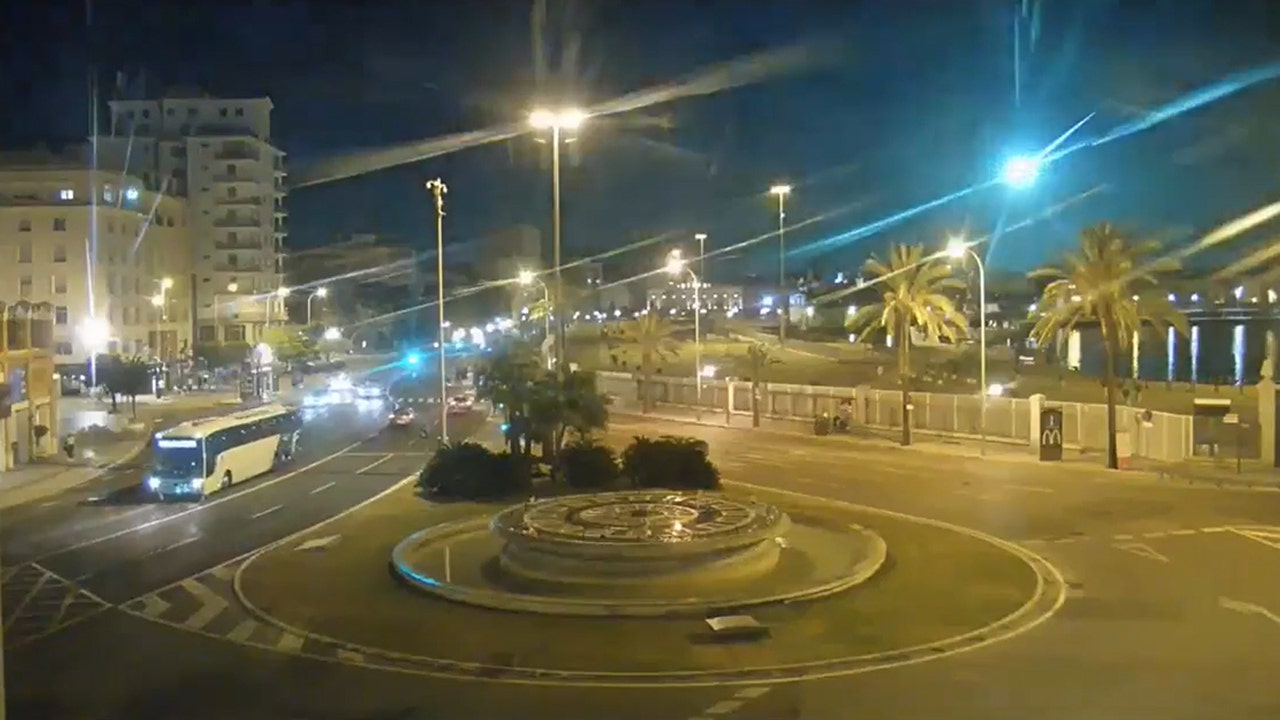
It’s a bird… it’s a plane… it’s a blue meteor? Fireball? Piece of a comet?
Whatever it was, it lit up the night sky for millions of people early Sunday morning in Spain and Portugal. Social media users took stunning pictures and videos for all to revel in the natural science phenomenon.
The spectacular sight crossed the night sky at 12:46 a.m., according to CCTV footage released by the mayor’s office in Cádiz.
The European Space Agency (ESA) Operations says the “blue meteor” everyone is referring to was actually “a small piece of a comet” that flew over the European countries at the speed of 45 kilometers a second, which is equivalent to almost 28 miles.
MERGER OF MASSIVE BLACK HOLES FROM EARLY UNIVERSE UNCOVERED BY WEBB TELESCOPE, SCIENTISTS SAY
It burned up over the Atlantic Ocean at an altitude of 60 kilometers, or more than 37 miles above the surface.
“The likelihood of any meteorites being found is very low,” ESA Operations tweeted after the agency’s Planetary Defence Office analyzed the size and trajectory of the object.
SCIENTISTS DISCOVER LARGE, ‘COTTON CANDY-LIKE’ PLANET WITH UNUSUALLY LOW DENSITY
The night sky in Cadiz, Spain, prior to the fireball’s appearance. (Ayuntamiento de Cadiz via Storyful)
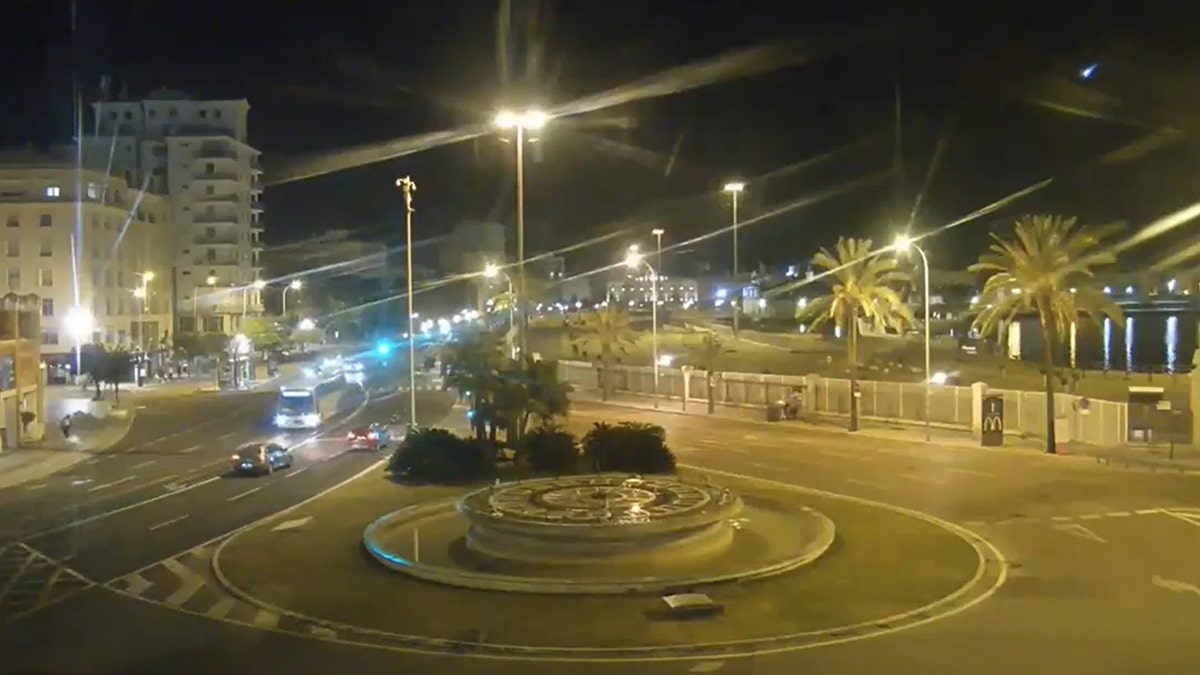
The moment the blue fireball first appeared on the camera rolling at the Cadiz mayor’s office. (Ayuntamiento de Cadiz via Storyful)
National Aeronautics and Space Administration explains the color was likely due to magnesium, and that “meteor color depends on whether the metal atom emissions or the air plasma emissions dominate.”
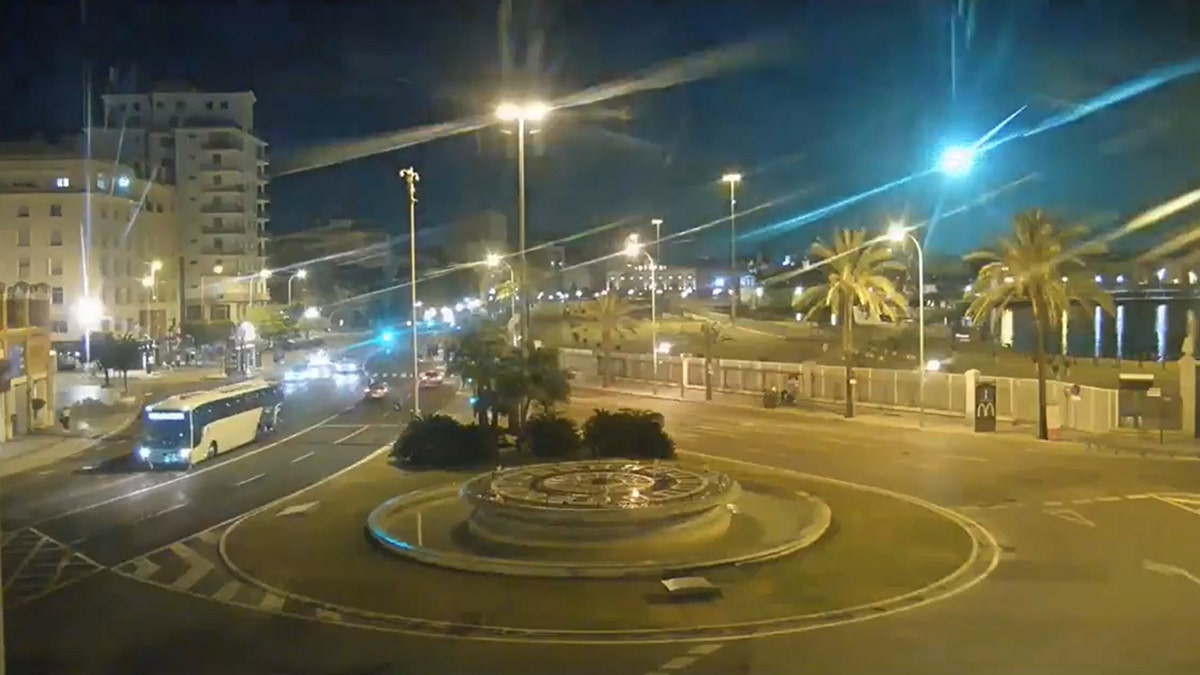
The blue fireball lit up Spain’s sky early in the morning May 19, 2024. (Ayuntamiento de Cadiz via Storyful)
“Short-period comets, also known as periodic comets, originate from a disk-shaped band of icy objects known as the Kuiper Belt beyond Neptune’s orbit, with gravitational interactions with the outer planets dragging these bodies inward, where they become active comets,” Space.com states.
Many on social media referred to what they witnessed as a “once in a lifetime sight,” according to news.com.au, with at least one joking, “That’s no meteor, that’s Optimus Prime.”
Fox News’ Mitch Picasso contributed to this report.
-

 World1 week ago
World1 week agoIndia Lok Sabha election 2024 Phase 4: Who votes and what’s at stake?
-

 News1 week ago
News1 week agoSkeletal remains found almost 40 years ago identified as woman who disappeared in 1968
-

 Politics1 week ago
Politics1 week agoUS Border Patrol agents come under fire in 'use of force' while working southern border
-

 Politics1 week ago
Politics1 week agoTales from the trail: The blue states Trump eyes to turn red in November
-

 World1 week ago
World1 week agoBorrell: Spain, Ireland and others could recognise Palestine on 21 May
-

 World1 week ago
World1 week agoCatalans vote in crucial regional election for the separatist movement
-

 World1 week ago
World1 week agoEurope matters to consumers, and so does your vote
-

 Politics1 week ago
Politics1 week agoNorth Dakota gov, former presidential candidate Doug Burgum front and center at Trump New Jersey rally


